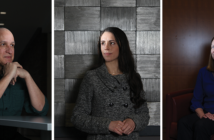Kindness is a Muscle
Adverse effects aside, a large part of what excites Britton about meditation is the science of it—in particular, the notion that it can change your brain.
“Neuroplasticity is a general neuroscientific principle: you get good at what you practice,” she explains. “This is a revolutionary discovery. We’re not fixed. … We have some leeway in self-cultivation.” That doesn’t mean, however, that we’re always practicing the right thing; most often, we’re not. “We have a lot of unhealthy mental habits. Self-denigration is a big one,” she says, adding that mindfulness is helpful in delineating your values, priorities, and goals. “Once you decide, for example, ‘I don’t want to be self-denigrating because instead of motivating me, it just makes me feel bad,’ you can employ mindfulness to notice what you are practicing, what kinds of mental habits—and by extension, what neural networks—you’re strengthening.” (Or not strengthening: if you’re practicing negative self-evaluation all the time, you’re not practicing empowerment and confidence.)
“It’s similar to a body workout—you have to have stronger muscle groups to do certain kinds of actions. [Building] patience and kindness and compassion is no different from building any other kind of muscle,” she says.
Meditation and neuroplasticity have other benefits as well. In a 2012 study, Britton and colleagues compared students who meditated with students who practiced music. Those who meditated not only showed increased well-being, but the increased well-being was associated with a greater increase in recall of positive words as well. “Meditation is changing the way students process emotional information,” says Britton.
Catherine Kerr, PhD, an assistant professor (research) of both medicine and family medicine, explains. “If you’re in a distressed state—for example, when you are burdened by excessive stress and negative rumination—you don’t process information very well, especially emotion-laden information,” she says. “One of the ways mindfulness may help relieve distress is by helping you process information better, because [it]seems to enhance working memory and changes early attentional processing, and both of these capacities are crucial for regulating emotion and behavior. Studies by our group and others suggest mindfulness may achieve these effects in part by changing the neural substrates underlying working memory and attention in the brain.”
Kerr, who helped design one of the first large clinical trials studying the placebo effect, also conducts extensive research in the cognitive neuroscience of meditation. In 2011, she was recruited to Brown from Harvard by Harold Roth, PhD, the founding director of Brown’s Contemplative Studies Initiative (an interdisciplinary group of faculty studying contemplative practices and experiences), and then-Associate Dean for Medical Education Phil Gruppuso, MD. Along with Ellen Flynn, MD, clinical assistant professor of psychiatry and human behavior and of medicine, Kerr codirects the scholarly concentration in Contemplative Studies at Alpert Medical School.
“Med students are … used to success, and they hold themselves to a very, very high standard. We want them not to beat themselves up inside,” Kerr says. “This isn’t about some esoteric contemplative traditions, it’s about helping people be better doctors.”
Contemplative Studies has been a scholarly concentration since 2007, and the Medical School is proving fertile ground for the mindfulness enterprise. Medical students can pursue a preclinical elective in mindfulness training. They can also participate in the Mindfulness Meditation Wellness Program, which gives them an opportunity to develop a meditation practice and obtain a mindfulness mentor. Britton, an assistant professor (research) of psychiatry and human behavior and of behavioral and social sciences, has provided mindfulness training to physicians, nurses, and schedulers at the Comprehensive Cancer Center at The Miriam Hospital.
While not a regular meditator, Fred Schiffman, MD, the Sigal Family Professor of Humanistic Medicine and associate physician-in-chief at The Miriam, sees the benefits of mindfulness. “Even the doubters realized it was important,” he says. “Willoughby taught us that when we go into a patient’s room and cleanse our hands, we need to cleanse our minds as well. That way we can concentrate and listen. We learned to be in the moment, have perspective, stay grounded. It made us better caregivers.”
Mason Hedberg ’08 MD’13 discovered meditation as an undergraduate, taking three Contemplative Studies classes before graduating. In medical school, he pursued the Contemplative Studies scholarly concentration, which includes completing the Mindfulness-Based Stress Reduction (MBSR) intervention. For his scholarly project, Hedberg developed a curriculum, Mindfulness Education in Medical School, covering both didactics and practice.
“My blood pressure is measurably lower than before I started meditating,” says Hedberg, now in his second year of a surgery residency at the University of Chicago. While he continues to practice mindfulness on the hospital wards, his mental state changes in the operating room. “That mindful awareness is involuntarily directed to my hands, the instruments they are holding, and the patient on the operating table in front of me,” Hedberg says. He adds that mindfulness helped him calm down during moments of high stress in his early med school years, and it has made him a better listener when interviewing patients.




